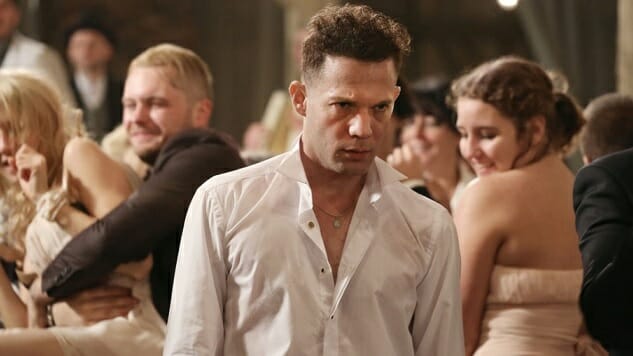Demon

In February, the outcome of 2016’s “best art house horror film” contest looked like a foregone conclusion. “What movie could possibly outclass the colonial homestead terror of Robert Eggers’ The Witch?” we asked. No one answered at first, but as summer crept along the movies replied, first with Karyn Kusama’s The Invitation in April, and then with Na Hong-jin’s The Wailing in June. Come October, Iranian-born director Babak Anvari’s Under the Shadow will join in the conversation, and now, nestled snugly within seasons, we have late Polish filmmaker Marcin Wrona’s Demon, his parting salvo before he took his own life last September.
Wrona’s story has a sad ending made heartbreaking by virtue of its ambiguity. The same can be said of Demon. In a word, the film is masterful, though it’s as likely to leave you disconsolate as to leave you mystified. Demon refuses to play by the rules of the “demonic possession” film, a la The Exorcist, Rosemary’s Baby and 2012’s The Possession, the last horror movie of note to gravitate toward to the dybbuk of Jewish legend. But as he skirts convention, Wrona quite willingly treads along the same sandbox as his contemporaries: He takes an elliptical approach to his material, favoring uncertainty over clarity and mental disquiet over explosive terror. Demon won’t shake you in your seat for 90 minutes. Like the entity driving its plot, it’ll stick to your soul for days after the credits roll.
Demon’s action unfolds around the wedding of Piotr (Itay Tiran in an incredible leading performance) and Zaneta (Agnieszka Zulewska), young, beautiful and madly in love despite a short relationship capped by an even shorter engagement. The brevity of their union concerns her dad (Andrzej Grabowski), but he does his best to warm up to Piotr despite his reservations. He gifts the couple with family property, an old farmhouse, too, though here “gift” is perhaps a term used loosely. Piotr flies to Poland from England to wed Zaneta, settle down and gussy up the house and the land it rests upon, and so their troubles begin: with a skeleton Piotr uncovers while mucking around with an excavator.
Did Piotr’s parents never teach him the old nursery rhyme? “If you dig up someone’s bones/Oh shit, that can’t possibly be a good omen, just get the fuck outta there pronto.” Seems not. Piotr neither disturbs the remains nor is himself disturbed by them, at least not at first: He has a wedding to attend, vodka to drink, and a gorgeous spouse to sneak off with for naughty times in between the ceremony and the reception. Even a nosebleed can’t put him off. As the shindig progresses, though, Piotr starts acting very unlike himself, and through his eyes we observe an escalating coterie of unsettling weirdness that’s best left for viewers to discover for themselves.
-

-

-

-

-

-

-

-

-

-

-

-

-

-

-

-

-

-

-

-

-

-

-

-

-

-

-

-

-

-

-

-

-

-

-

-

-

-

-

-








































